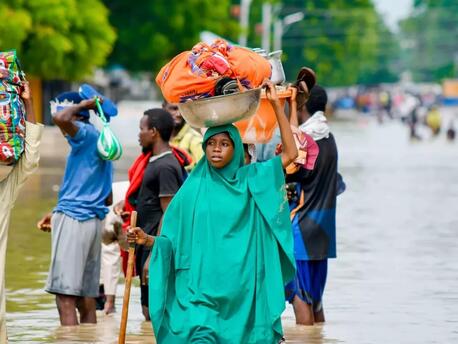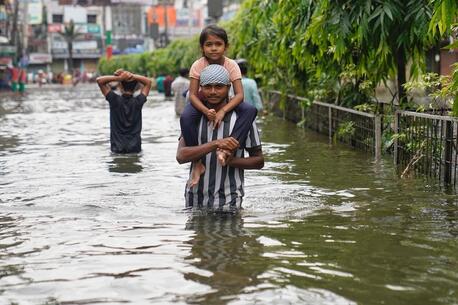
Already At-Risk Children in Nigeria Face New Hazard: Severe Flooding
UNICEF is rushing emergency lifesaving assistance to families affected by flooding across Nigeria. More help is needed.
The worst flooding to hit Nigeria in a decade has killed more than 600 people and displaced over 1.3 million in 34 out of the country's 36 states since September.
High rainfall and overflow from rivers have destroyed or partly damaged more than 200,000 houses. Rising flood levels have collapsed infrastructure including public health facilities, water systems and sanitation facilities, increasing the risk of waterborne diseases like cholera, diarrhea and malaria. In the northeastern states of Borno, Adamawa and Yobe alone, 7,485 cholera cases and 319 associated deaths had been reported as of Oct. 12.
Children living in makeshift displacement sites lack basic water, sanitation and hygiene (WASH) facilities. They are also exposed to increased protection risks including separation from their families and gender-based violence.
More than 2.5 million people in Nigeria are in need of humanitarian assistance and are at increased risk of waterborne diseases, drowning and malnutrition due to the most severe flooding in the past decade.
— UNICEF Nigeria (@UNICEF_Nigeria) October 21, 2022
See full press release ----https://t.co/IJsX8LvGyr
"Children and adolescents in flood-affected areas are in an extremely vulnerable situation," said Cristian Muduate, UNICEF Representative in Nigeria. "They are particularly at risk of waterborne diseases and emotional and psychological distress. UNICEF is working closely with the government and other partners to provide lifesaving assistance to those who are most in need."
The floods are the latest hardship in what is already a precarious humanitarian situation in Nigeria. Immediate priority needs for children include health and WASH, along with shelter and food.

Akpoebi Germany, left, stands on a narrow plank bridge outside his home, with his children, from left: Peretimifa, Samuel and Joy in Sagbama, Bayelsa State, Nigeria. © UNICEF/UN0722934/Esiebo
According to UNICEF's Children's Climate Risk Index, released in 2021, Nigeria is considered to be at "extremely high risk" of the impacts of climate change, ranking second — tied with Chad, after the Central African Republic — out of 163 countries.
Globally, approximately 1 billion children are growing up in "extremely high risk" countries. They face a deadly combination: exposure to multiple climate and environmental shocks on top of existing vulnerabilities.

Floodwaters surround Adagbabiri Primary Health Center in Sagabama, Bayelsa State, Nigeria. © UNICEF/UN0722936/Esiebo
To date, UNICEF has supported flood response in three Nigerian states — Jigawa, Niger and Kaduna — through a mix of emergency cash transfers, distribution of cholera prevention kits and learning materials, government-led mobile health teams and temporary learning centers. Heavy rains are expected to continue for several weeks, and humanitarian needs will rise as well.
With additional support, UNICEF can scale up its response in other states, including providing lifesaving medicines and medical equipment and water chlorination and sanitation supplies, and supporting sexual and gender-based violence prevention and response.
Help UNICEF reach vulnerable children survive the impacts of the climate crisis. Your contribution can make a difference. Please donate.
HOW TO HELP
There are many ways to make a difference
War, famine, poverty, natural disasters — threats to the world's children keep coming. But UNICEF won't stop working to keep children healthy and safe.
UNICEF works in over 190 countries and territories — more places than any other children's organization. UNICEF has the world's largest humanitarian warehouse and, when disaster strikes, can get supplies almost anywhere within 72 hours. Constantly innovating, always advocating for a better world for children, UNICEF works to ensure that every child can grow up healthy, educated, protected and respected.
Would you like to help give all children the opportunity to reach their full potential? There are many ways to get involved.




